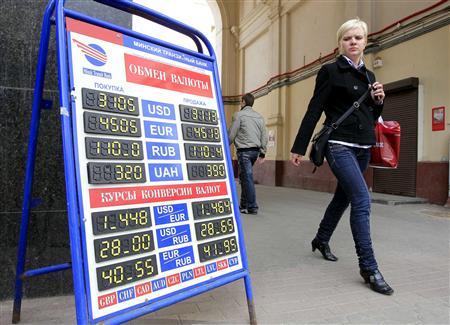
Integrating Belarus: Problems and Prospects
Publication: Eurasia Daily Monitor Volume: 8 Issue: 95
By:

On May 5, the National Bank of Belarus, responding to pressure to devalue the Belarusian ruble, stipulated that by May 12, the exchange course with hard currency (the US dollar, the Euro and the Russian ruble) could increase from its current 8 percent depreciation rate to 12 percent. At the same time, in what one editorial described as a “tragicomedy” of indecision, the National Bank has declined to take more decisive measures before the receipt of additional loans from Russia, at which time it intends to revert to a single exchange rate once again (BG Delovaya Gazeta, May 6). In other words, it refuses to devalue the Belarusian ruble to what financial experts see as its real value of around BR 5,000 to the dollar, as opposed to the official rate of BR 3,001.
The Belarusian currency problem is influencing discussions about the integration of Belarus with neighboring states, and in particular Russia and Kazakhstan through the Common Economic Space (CES). Russia has offered further loans, but all indications are that it is not interested in responding to Lukashenka’s latest request if the consequence of a $3 billion “rescue loan” from Russia and the Eurasian Economic Community is the artificial restoration of the Belarusian currency to its former status. Russia would like to see the currency issue resolved before it agrees to further loans. Belarus’ difficult position is attributed largely to overspending, partly on increased prices for energy imports, but also because of rash wage and pension increases offered to residents by the president prior to the 2010 elections (AFP, May 6; EDM, April 12).
Kazakhstan is anxious for its two partners to come to a swift agreement on the currency question. On April 19 in Almaty, the head of the Kazakhstan Central Bank, Grigory Marchenko, stated that the agreement on a CES necessitated “coherent” currency policy, repeating Russian First Deputy Minister Igor Shuvalov’s demand in 2010 for a common currency that would follow the acceptance of a common market. Two currency devaluations took place in Kazakhstan in 1999 and 2005 of 63 percent and 25 percent respectively. Belarus is very unwilling to take such a step, which would repeat the events of early 2009 (Bloomberg, April 19, EDM, January 12, 2009). In April, the Economic Council of the CIS approved the latest draft paper on a free trade zone, to be discussed this month in Minsk (the original was in 2008) that would result in more liberal trade practices among several former Soviet states. To date the stumbling block has been export duties (RIA Novosti, April 15).
Currency and trade are only two aspects of integration, however. Notably the terrorist attack in Minsk on April 11—the investigation into which is under the personal guidance of the president—was followed immediately by a meeting of the Permanent Council of the Collective Security Treaty Organization (CSTO) in Moscow, which issued a statement that only joint international activities could successfully combat terrorist threats (Belarusian Telegraph Agency, April 12). The CSTO Secretary-General Nikolay Bordyuzha, appeared on Belarusian TV Channel One, and reiterated the need for joint efforts to “defeat this evil,” the clear implication being that such assaults were beyond the capacity of Belarus’ security forces (www.telegraf.by, April 13).
The functions and scope of the CSTO remain unclear, however, as is Belarus’ role within it. The republic, for example, has little interest in committing troops to danger areas that are considered vital to the Russian Federation and Central Asia, particularly the Tajik-Afghan border. In addition, from Russia’s perspective, Minsk is using its membership to solicit economic benefits from Russia. Yet, since Belarus’ relations with the West have been largely on hold since the post-election violence last December, Russia is engaged in tightening bilateral security ties with its neighbor, partly through joint military exercises (RIA Novosti, April 28; EDM, September 30, 2009). The CSTO, currently under the presidency of Belarus, met in Moscow in early May and summarized its priorities as developing responses to crises and deploying collective peacekeeping forces (Beltelradio, May 2). Neither has much relevance for Belarus.
In an opinion piece for RIA Novosti, Thomas Gomart noted that despite his perceived weakness, Alyaksandr Lukashenka has managed to stay in office, in contrast to his counterpart in Cote D’Ivoire, Laurent Gbagbo. One reason for his longevity is the relative lack of interest of the international community in the internal affairs of Belarus. He also notes that while the CES is of deep importance to Moscow, there has been little chance to adopt a stable policy toward Belarus because of the changing political situation within the country (RIA Novosti, April 14).
Lukashenka, in his inimitable fashion, refuses to recognize his own responsibility for Belarus’ economic woes and has adopted a victim complex. The economic crisis is taking place against the backdrop of trials of political activists, including former presidential candidates Andrey Sannikau, Uladzimir Nyaklayeu and Vital Rymasheuski (Nasha Niva, May 5), allowing the president to make regular references to “fifth columns” upsetting the social equilibrium. He makes constant appeals also for renewed relations with Europe, which would provide a logical escape hatch from commitment to Russia’s goals, while maintaining his commitment to ethnic and historical ties with Russia, particularly the joint commemoration of the “Great Patriotic War” (www.tvr.by, May 7).
He has benefited hitherto from the ramshackle and ill-defined nature of the CIS, CSTO and the virtually moribund Russia-Belarus Union. The CES agreement, however, necessitates a more urgent response from Minsk, and conversely offers Russia an opportunity to take a stronger stance on the currency/loan issues. The logical outcome of a common currency seems only a question of time.




